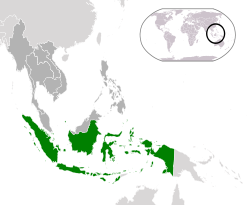
Back Индонезиа Abkhazian Indônèsia ACE Индонезие ADY Indonesië Afrikaans Indonesien ALS ኢንዶኔዥያ Amharic Indonesia AMI Indonesia AN Indonesia ANG इंडोनेशिया ANP
Republic of Indonesia Republik Indonesia (Indonesian) | |
|---|---|
| Motto: Bhinneka Tunggal Ika (Old Javanese) "Unity in Diversity" | |
| Anthem: Indonesia Raya "Indonesia the Great" | |
| National ideology: Pancasila (Sanskrit) "The Five Principles" | |
| Capital and largest city | Jakarta 6°10′S 106°49′E / 6.167°S 106.817°E |
| Official languages | Indonesian |
Indigenous languages | 718 languages[a][1] |
| Ethnic groups | See ethnic groups |
| Religion (2023) |
|
| Demonym(s) | Indonesian |
| Government | Unitary presidential republic |
| Prabowo Subianto | |
| Gibran Rakabuming Raka | |
| Puan Maharani | |
| Sunarto | |
| Suhartoyo | |
| Legislature | People's Consultative Assembly (MPR) |
| Regional Representative Council (DPD) | |
| House of Representatives (DPR) | |
| Independence from the Netherlands | |
| 17 August 1945 | |
| 27 December 1949 | |
| Area | |
• Total | 1,904,569[3] km2 (735,358 sq mi) (14th) |
| 4.85 | |
| Population | |
• Q2 2024 estimate | |
• 2020 census | 270,203,917[5] |
• Density | 143/km2 (370.4/sq mi) (88th) |
| GDP (PPP) | 2024 estimate |
• Total | |
• Per capita | |
| GDP (nominal) | 2024 estimate |
• Total | |
• Per capita | |
| Gini (2024) | medium inequality |
| HDI (2022) | high (112th) |
| Currency | Indonesian rupiah (Rp) (IDR) |
| Time zone | UTC+7 to +9 (IDT) |
| Date format | DD/MM/YYYY |
| Drives on | Left |
| Calling code | +62 |
| ISO 3166 code | ID |
| Internet TLD | .id |
Indonesia,[c] officially the Republic of Indonesia,[d] is a country in Southeast Asia and Oceania, between the Indian and Pacific oceans. It consists of over 17,000 islands, including Sumatra, Java, Sulawesi, and parts of Borneo and New Guinea. Indonesia is the world's largest archipelagic state and the 14th-largest country by area, at 1,904,569 square kilometres (735,358 square miles). With over 280 million people, Indonesia is the world's fourth-most-populous country and the most populous Muslim-majority country. Java, the world's most populous island, is home to more than half of the country's population.
Indonesia is a presidential republic with an elected legislature. It has 38 provinces, of which nine have special autonomous status. The country's largest city, Jakarta, is the world's second-most-populous urban area. Indonesia shares land borders with Papua New Guinea, East Timor, and the eastern part of Malaysia, as well as maritime borders with Singapore, Peninsular Malaysia, Vietnam, Thailand, the Philippines, Australia, Palau, and India. Despite its large population and densely populated regions, Indonesia has vast areas of wilderness that support one of the world's highest levels of biodiversity.
The Indonesian archipelago has been a valuable region for trade since at least the seventh century, when Sumatra's Srivijaya and later Java's Majapahit kingdoms engaged in commerce with entities from mainland China and the Indian subcontinent. Over the centuries, local rulers assimilated foreign influences, leading to the flourishing of Hindu and Buddhist kingdoms. Sunni traders and Sufi scholars later brought Islam, and European powers fought one another to monopolise trade in the Spice Islands of Maluku during the Age of Discovery. Following three and a half centuries of Dutch colonialism, Indonesia secured its independence after World War II. Indonesia's history has since been turbulent, with challenges posed by natural disasters, corruption, separatism, a democratisation process, and periods of rapid economic growth.
Indonesia consists of hundreds of distinct ethnic and linguistic groups, with Javanese being the largest. A shared identity has developed with the motto "Bhinneka Tunggal Ika" ("Unity in Diversity" literally, "many, yet one"), defined by a national language, cultural diversity, religious pluralism within a Muslim-majority population, and a history of colonialism and rebellion against it. A developing country, Indonesia is classified a newly industrialised country, with its economy the world's 16th-largest by nominal GDP and the 8th-largest by PPP. It is the world's third-largest democracy, regional power, and is considered a middle power in global affairs. The country is a member of several multilateral organisations, including the United Nations, World Trade Organization, G20, BRICS and a founding member of the Non-Aligned Movement, Association of Southeast Asian Nations, East Asia Summit, MIKTA, APEC, D-8, and the Organisation of Islamic Cooperation.
Cite error: There are <ref group=lower-alpha> tags or {{efn}} templates on this page, but the references will not show without a {{reflist|group=lower-alpha}} template or {{notelist}} template (see the help page).
- ^ "Bahasa dan Peta Bahasa". Kemdikbud.com. Kemdikbud. Retrieved 18 August 2024.
- ^ "Religion in Indonesia". Archived from the original on 21 June 2024. Retrieved 21 June 2024.
- ^ "UN Statistics" (PDF). United Nations. 2005. Archived (PDF) from the original on 31 October 2007. Retrieved 31 October 2007.
- ^ Admin, "Indonesian Population June 2024", Ministry of Home Affairs (Indonesia) (in Indonesian), retrieved 20 October 2024
- ^ Cite error: The named reference
2020censuswas invoked but never defined (see the help page). - ^ a b c d "World Economic Outlook Database, October 2024 Edition. (Indonesia)". www.imf.org. International Monetary Fund. 22 October 2024. Retrieved 22 October 2024.
- ^ "Gini ratio Maret 2024 tercatat sebesar 0,379". bps.go.id. Retrieved 15 July 2024.
- ^ "Human Development Report 2023/24" (PDF). United Nations Development Programme. 13 March 2024. p. 289. Archived from the original on 14 March 2024. Retrieved 13 March 2024.
- ^ "INDONESIA | Meaning & Definition for UK English | Lexico.com". Lexico Dictionaries | English. Archived from the original on 28 February 2020. Retrieved 7 May 2022.
- ^ "Indonesia". Merriam-Webster.com Dictionary. Merriam-Webster. Retrieved 7 May 2022.



